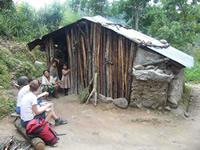Global Health Track

Alissa Correll, MD, Class of 2020 examining a patient
The Department of Family Medicine of the University of Rochester has a Global Health Track (GHT) for interested residents. The track combines resident education with service to a rural community in Honduras, Central America. The program has been running since 2003 and is hugely popular with residents and very successful at improving the health of the Honduran population.
General Philosophy
Education
Most people learn best by doing. The GHT puts residents in charge of Honduras-based activities to foster learning. Faculty help guide residents and provide examples for residents so they have the freedom to learn at a level appropriate for their needs and pre-existing skill sets. Residents are actively involved with a number of projects in Honduras. First year residents work in collaboration with senior residents on specific interventions. As the intern becomes comfortable, they take on a larger and larger leadership role for selected projects. Some residents even choose to manage entire projects/interventions with minimal input from faculty. The GHT offers the flexibility to adult learners to get the most out of this unique opportunity.
When not in Honduras, Global Health activities focus on preparing residents for overseas work through annual Global Health conferences the residents create and manage and through a Global Health Book Club. The conferences present didactic training on medical topics pertinent to overseas work. The book club deals more with the ethics, cultural differences and experiential topics related to working in developing countries.
Service

Home survey of a typical wood house
The Department is highly committed to improving health outcomes for all people; no matter their social status, gender, race, religion or nationality. This belief is part of why we created the GHT. We also believe in interventions that create the best outcomes with the least amount of resources. In Honduras, it became clear that the people were more in need of the basic necessities of life, such as water and food, than they were in need of medicines. Therefore, our Global Health activities focus more on rural/infrastructure development than on curative medicine at this time. Although infrastructure development takes more time and effort than providing basic medical care, the improved health outcomes occur at a community level instead of just at an individual level.
Read the most recent trip report to get a feel for what we do in Honduras, or visit www.sanjosepartners.org for a detailed description of our activities. Visit our Support Us page, if you have the ability to support our Honduran efforts. All money donated goes to help Honduras and is not used for travel expenses, etc.
Objective
To prepare highly motivated and accomplished residents to care for underserved populations anywhere in the world.
GHT and Residency Education Highlights
- Two or more interested residents per class are selected to enter the GHT. Between 4-6 residents per class usually select the GHT.
- GHT residents organize annual global health residency conferences where much of the didactic training occurs.
- Global Health Book Club meets 3-4 times a year to review pertinent works that help readers appreciate the issues surrounding world health.
- GHT residents visit the Honduras project site 2-3 times during their residency, each time staying two weeks as part of a medical team.
- Trips to Honduras are multidisciplinary with at least two family medicine faculty running the brigade and experts in other fields such as family therapy, engineering and dentistry joining the brigade.
- Residents must contribute from their CME allowance to defray costs of overseas travel but the remaining expenses are covered by the residency program.